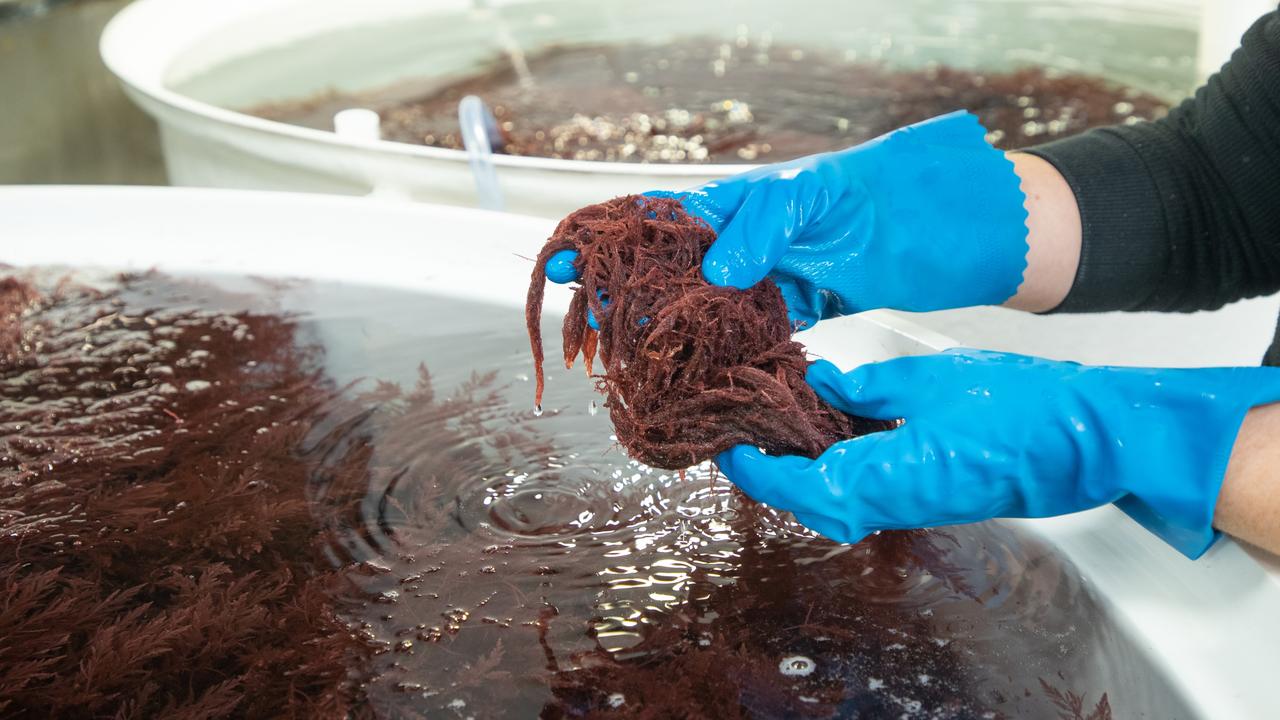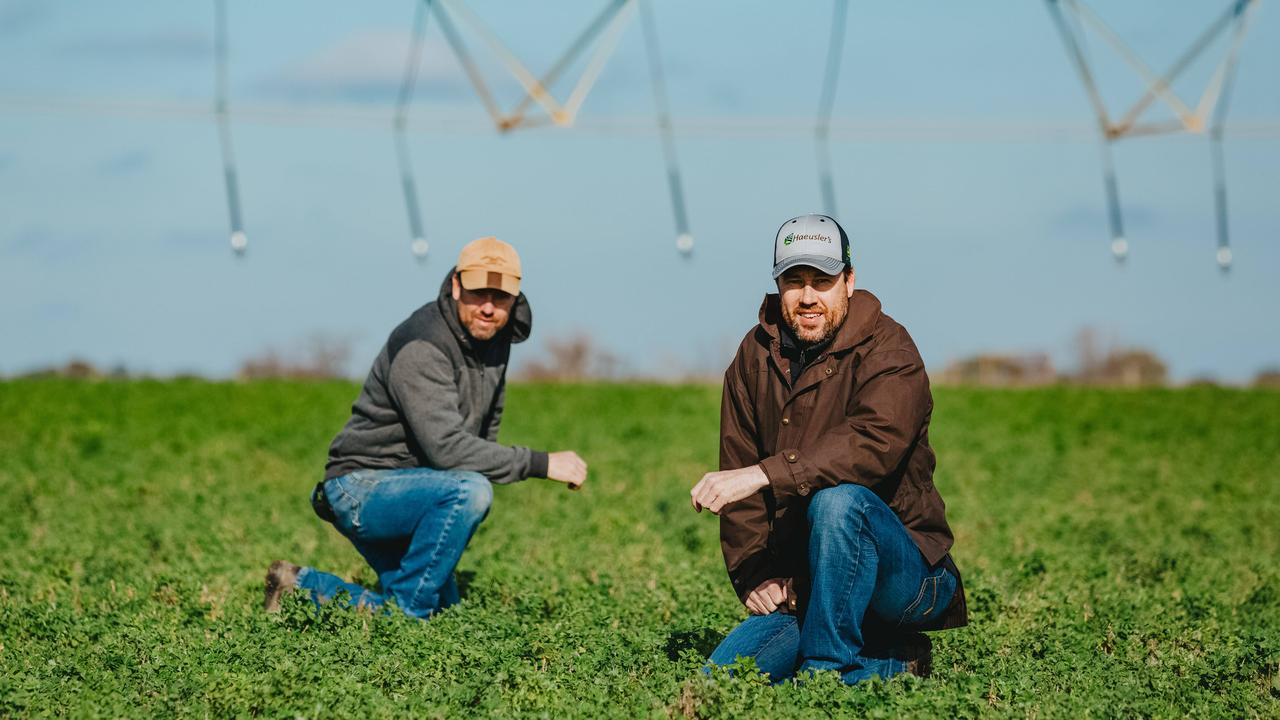Pollards stunned by rush on apples at farmers’ markets
Gary and Heather Pollard have been blown away by skyrocketing demand for locally grown apples and pears at Victoria’s farmers’ markets.
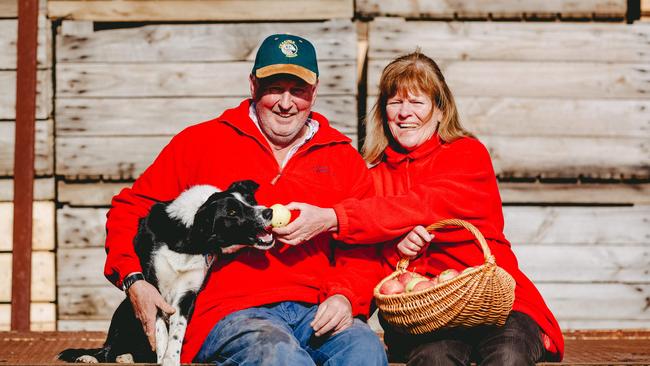
MIRACLES do happen, even during world-crippling pandemics.
When fourth and fifth generation Elphinstone apple orchardists Gary and Heather Pollard first started to hear of a virus sweeping the globe they became just a little concerned.
Their business, after all, relied wholly on mixing with the public, selling their apples and pears at 15 farmers’ markets across Victoria.
Yet they had faced disasters before and come out the other side, so they weren’t getting carried away.
They had overcome droughts, fought back when the bottom fell out of the fruit-growing business a decade ago, and coped in 2009 when bushfire ravaged their Redesdale property where they run a side business raising Merino sheep.
Yet somehow this was different, not like anything they had faced before.
On the first Saturday in March, the possible seriousness of the situation started to become apparent. Gary was selling at a Carlton market and Heather doing likewise at Woodend. Both noticed some of their customers were wearing masks.
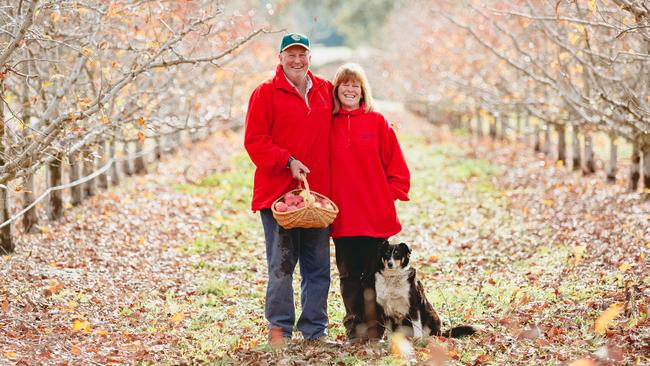
When they got home to Elphinstone that night they conferred on what they had both seen, and concluded they could be in trouble. The relaxed family atmosphere so typical of farmers’ markets had clearly taken on a strained edge, a sense of insecurity.
“You could see people looking at others who were wearing masks and asking ‘why are they doing that?’,” Gary recalls.
By the second weekend in March they reasoned they were in big trouble. While many stallholders were happy to continue in spite of the virus, alarmingly markets started quickly closing.
Within days, their 15 markets would drop to seven.
The whole business model of Pollards Apples and Pears seemingly had been smashed overnight.
Gary’s initial reaction was “Oh sh.., what are we going to do?”.
“Our biggest problem was how we were going to get the fruit off the trees. If one of our local pickers contracted the virus then it could have shut us down for at least 14 days straight off, and that would have been diabolical. You have just a 10-day window to get a variety off the trees and it would have come right smack at our worst time.”
Thankfully that didn’t happen. Their small band of pickers worked furiously to harvest one of the biggest crops of apples the Pollards had grown in decades.
Yet what good were all those apples without somewhere to sell them? Some could go into cool storage to hopefully be sold later.
Worst case scenario, many would be fed to the sheep.
That’s when the miracle came in.
Bendigo’s main Community Farmers’ Market was forced to close for precautionary reasons but the market manager organised a weekly Thursday pop-up market to bridge the gap – and progressively remaining markets changed, adapted to coronavirus protocols and in some cases took a break before reopening in more manageable locations.
Although the markets, classed as essential services, struggled on in vastly reduced numbers, Gary and Heather, like many of their stallholder colleagues, braced for a gigantic hit to their sales.
It didn’t come.
JUMP IN SALES
Instead, Heather’s phone “went crazy” with customers demanding to know where they could buy their apples and pears. New customers began appearing at the few markets they attended. Regulars, consumed by the trend to be more adventurous in home cooking, bought in far greater quantities than normal.
In fact, sales went up by an estimated third.
“We’ve got more apples going out now than we did pre-COVID,” Gary says. “We’re selling more at less markets. I don’t know how that works but it does.”
For Heather this sales upturn was a godsend. “You see, I’ve got orders already,” she says proffering her mobile phone. “People will text me before a market, so I can take those orders with me. Some are ordering for all the family.
“Whereas once people would buy for a week, now they’ll buy enough for two or three weeks. And they’re getting their neighbours apples too.
“It’s a rotating thing because the next week we’ll have someone else who’s shopping for two or three weeks as well.”
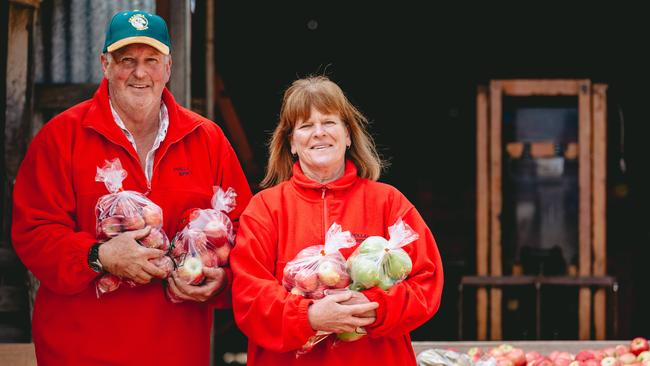
CRAZY DAYS
It’s not just apples. Pears, which comprise less than a quarter of the couple’s output, are “selling unbelievably”.
“Things have gone crazy this year,” Gary says. “Customers have been coming out rain, hail and shine. Down in Melbourne they were like drowned rats a couple of times there. Normally on those sorts of days the market would be deserted, but no, they just stood there in the wind and rain. They had come to shop and they were shopping
no matter.”
Heather puts much of their success down to the market organisers’ determination to keep operating.
“The farmers’ markets have been wonderful. We’re accredited with the Victorian Farmers’ Markets Association and they have run so well.
“They had all the protocols in place straight away, the distances people had to stand apart, the number of people allowed in one market, everything.”
CHANGED ROUTINE
Along with the markets themselves, Gary and Heather’s market-day routines have changed markedly.
While operating restrictions are progressively being relaxed, visitors are still encouraged to get in and out as quickly as possible and transactions have been sped up.
“Previously you would have three or four people coming up to you at once, but since COVID they have to approach single file – so it’s easier on us,” Heather explains.
Cashless operation
Likewise, 99 per cent of transactions are done without money being exchanged, using the mobile payment system Square that allows contactless credit card payments.
“The continuing markets all stipulated that to keep trading we needed to be cashless,” Heather says. “We went the Square way rather than an EFTPOS machine and it’s just so quick and so wonderful.”
More recently, though, she has noticed children coming up to buy and swipe with their parents’ credit cards. “Looking at them doing that has really opened my eyes. They have adapted to it so easily and I suspect there could be some family squabbles going forward,” she says.
The few customers who do offer cash are not turned away. Thanks to a simple washing apparatus put together by Gary, they are allowed to trade.
“We’ve got a bucket of soapy water with a slot cut into it, and if someone wants to buy a bag of apples I ask them to put their money in the slot – so no one touches it. The money gets washed and I return them washed money in change.”
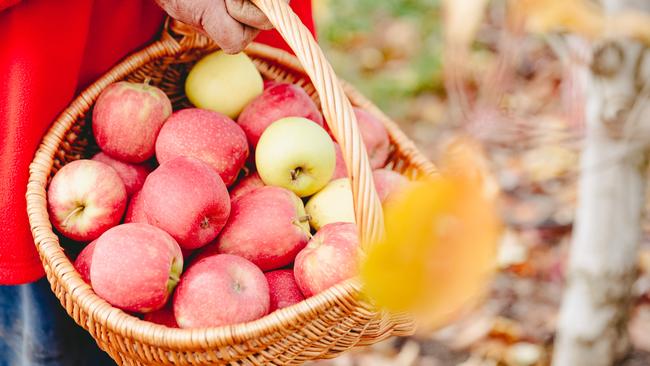
NO SAMPLES
One of the few downsides for customers is no longer are they able to be offered sample apples or pears to taste, and until recently only 200 customers were allowed in a market at once.
“They measured the distances of the market area and when 200 are in they shut the gate – and when 10 people go out, 10 come in,” Heather outlines.
Gary and Heather both believe some of these routines will become the “new normal” at markets.
Customers have become used to them, they say, and in many ways they make working easier for stallholders.
They follow a strict sanitising program and sell their fruit in two-kilogram plastic bags so it’s untouched by customers.
Plus, they never allow members of the public behind their stall table or within distancing guidelines.
Most customers have happily accepted these restrictions, Heather says.
She believes visitors have become more obliging of others through coronavirus.
“They need to stand in a queue and wait and they’re happy to do that, because they’re all standing in that queue,” she says.
Above all, both have been heartened by customer feedback, both face-to-face and through a review process with Square.
Says Gary: “So many of the customers say to us ‘thanks for coming, thanks for being here. We want to buy your fruit’.”
Adds Heather: “You think ‘yep, it’s worth getting up early this morning’. Plus, you go to a market and sell a lot of fruit and you know you have pleased a lot of people.”
What saddens them, though, is that many stallholders haven’t been so lucky. Some, especially newer, less established sellers, dropped out when the virus first hit and have not returned.
NO LOST SLEEP
Although shaken by the past three months, in tough country fashion the pair insists they never lost sleep over what might happen. They figured they could only do as much as they could, the rest was fate.
Their biggest question involves the future of the business itself. Without children, there are no heirs to take over the generations-old Pollards Apples and Pears operation and inevitably they will have to sell.
“It will happen,” Gary assures. “There will be a last day for sure, and it will be a great buy for someone.”
Says Heather, who has thrived on selling at markets for 35 years: “I think I have done my time but when the day comes I will definitely miss the customers.”
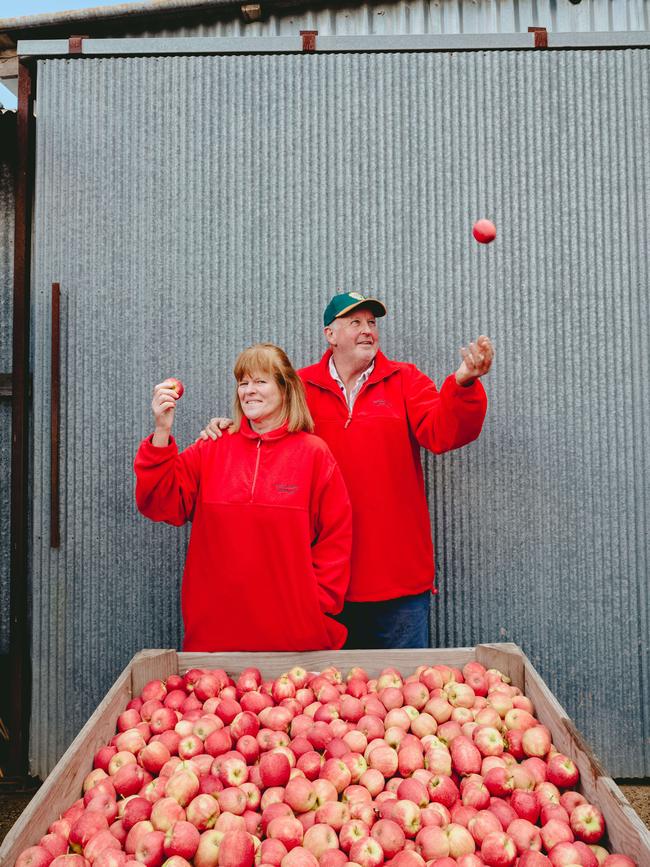
What makes both happy is that when they do sell they will be able to stay living in the old house of Gary’s grandad, on a separate title and with the orchard and their much loved sheepdogs around them.
FARM FILE: Pollards Apples and Pears
Gary and Heather Pollard grow packham and buerre bosch pears and akane, jonathon, gala, golden delicious, red delicious, fuji, rosy glow, Granny Smith and sundowner apples on their seven-hectare Elphinstone property. Their popular pink lady apples sell for $8 a two-kilogram bag, with others selling for $3 to $6 a bag.
SHELL SHOCK
While coronavirus casualties have been numerous among smaller primary producers, some have been little affected, particularly those selling at farmers’ markets.
Typical are Mark Jankelson (pictured, right) and wife Hilary who run Redesdale-based Husk and Harvest Walnuts.
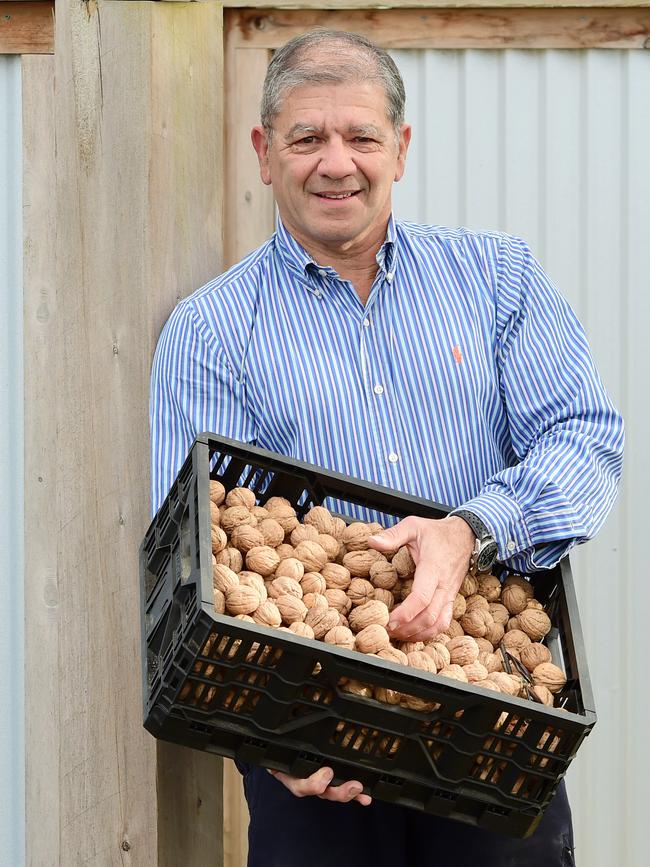
“It’s been amazing,” says Mark of the past three months. “We fully expected to be in the doldrums but we have been doing remarkably well all things considered.”
The saviours, he says, are the fact markets were allowed to operate under essential services provision, and that 70 per cent of them continued to run. While they lost three markets due to closure, in Maldon, Daylesford and Kyneton, the hurriedly instituted pop-up market in Bendigo filled the gap.
“Plus, I think people are getting the gist that farmers’ markets are actually safer than going to a supermarket,” says Mark, whose company also operates from a Murray Valley property in addition to Redesdale.
“So we haven’t seen much of a fall-off in sales. We have obviously seen a drop in visitor traffic at the likes of Woodend and Castlemaine, but the regulars have continued to come.
“I can’t prove this but we also have a feeling people are wanting to shop and support local. I don’t know if that is instead of supermarkets, or in addition to supermarkets, but we are seeing more people than before who are from the local area.
“We suspect it might be from a food security point of view, knowing where their food is coming from and meeting and talking to the growers.”
Likewise, sales of walnut products to restaurants, wholefood stores and greengrocers have bounced back as more reopen.
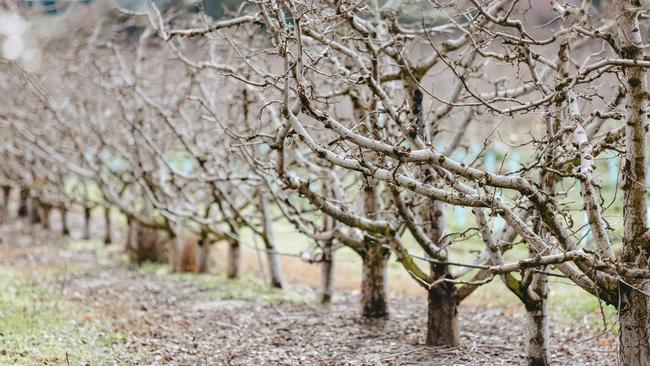
REGION PROFILE: BENDIGO
The Pollards’ nearest regional city is Bendigo, a UNESCO global City of Gastronomy. With a vibrant foodie culture and growing population, up 1.8 per cent in 2019, Bendigo residents come out in droves to buy from the weekly Bendigo Community Farmers’ Market. Since the pandemic hit, it has gained many new customers.
MORE
TREECHANGER SURGE: VICTORIA’S TOP SHIRES FOR SMALL FARM SALES
YOUNG ARCHITECTS DITCH DESKS FOR GROWING GRAPES AT LONGWARRY

